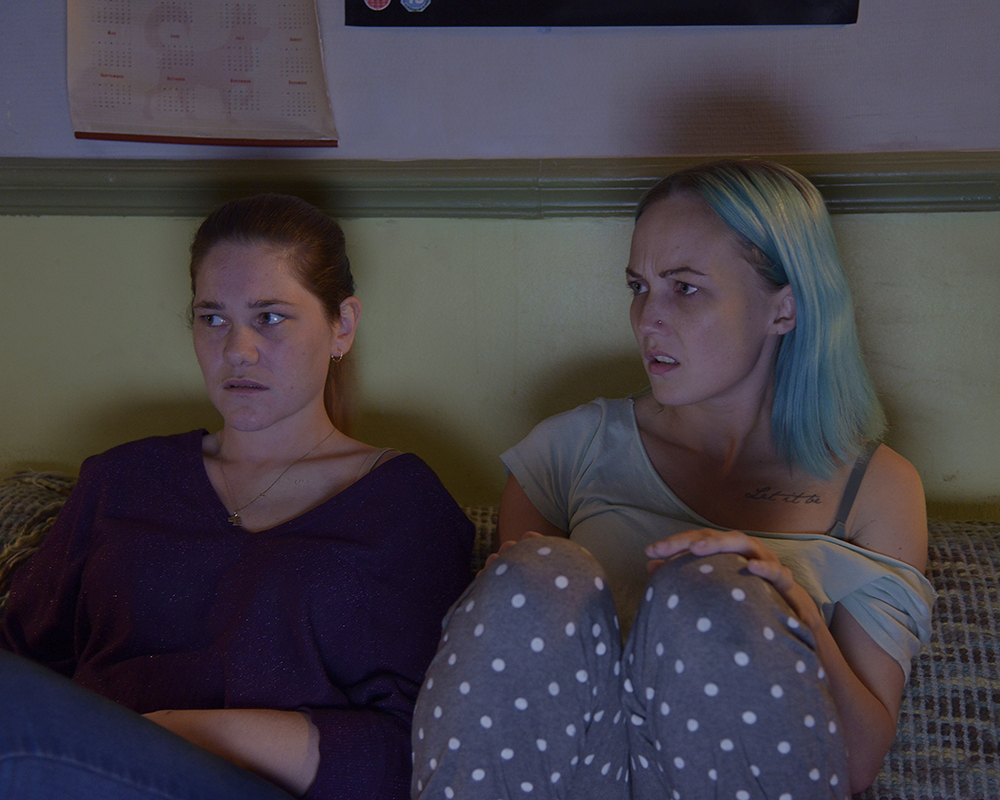Lynn + Lucy review - a bruising tale of female friendship | reviews, news & interviews
Lynn + Lucy review - a bruising tale of female friendship
Lynn + Lucy review - a bruising tale of female friendship
Fyzal Boulifa directorial debut is a stark, unforgiving portrait of modern Britain

British director Fyzal Boulifa makes his feature film debut with a bruising account of female-friendship torn apart by personal tragedies and gossipmongers, on a council estate in Harlow.
At under an hour and a half, Boulifa shows a gift for economic storytelling, but that doesn’t mean it comes without an emotional wallop. The story centres on two twenty-something mothers who have been best friends since school. Lynn is played by street-cast actress Roxanne Scrimshaw, who makes a startling debut, and Lucy by Nichola Burley (Andrea Arnold’s Wuthering Heights), who delivers at every turn. Together they make for a powerhouse duo, with their dramatic skills masking some of the film’s more uneven elements.  Pregnant at sixteen, Lynn is married to her high school sweetheart Paul (Shaq B. Grant). Their marriage is an unhappy, sexless one, where Lynn’s only joy is found in her natural maternal gifts. The rest is frustration and regretful imagining of what might have been whilst doing the ironing and watching Dancing on Ice.
Pregnant at sixteen, Lynn is married to her high school sweetheart Paul (Shaq B. Grant). Their marriage is an unhappy, sexless one, where Lynn’s only joy is found in her natural maternal gifts. The rest is frustration and regretful imagining of what might have been whilst doing the ironing and watching Dancing on Ice.
Lucy is a different story. With her cookie-monster-blue-hair, she’s young at heart. Knocking back shots at the local nightclub and desperate to escape domesticity, Lucy is struggling to adjust to the birth of her son with her much younger, computer game-loving boyfriend, Clark (Samson Cox-Vinell).
Their friendship appears unbreakable, but then Lynn gets a job at a local hair salon run by Janelle (Jennifer Lee Moon), where local curtain-twitcher Caroline (EastEnders’ Little Mo, Kacey Ainsworth) also works. When tragedy strikes, Lynn finds she’s drawn closer to the inner circle of the salon, fracturing her long-term friendship with Lucy.
Boulifa’s story is dramatically uneven, unable to successfully navigate a transition in the second act to a more intense moral thriller, even with the guiding hand of Ken Loach who acts as a producer. It’s also guilty of falling into some of the miserabilist clichés of kitchen sink dramas.
Still, as a social realist drama centred on working-class life in Britain, Boulifa is clearly deeply sympathetic to his subject. He attempts to capture the struggles of white-working class communities, without totally ignoring tensions of race, gender and even religion.
One of the film’s finest aspects is also its most subtle. Gossip operates like a stone thrown into a pond, with its consequences rippling out. Here gossip is on the streets and on our screens, fuelled by the toxic tactics of tabloid moral-flag waving. If Boulifa is truly reflecting today’s Britain in Lynn + Lucy, we should be horrified at how empathy and forgiveness have been replaced by judgement and division.
rating
Share this article
The future of Arts Journalism
You can stop theartsdesk.com closing!
We urgently need financing to survive. Our fundraising drive has thus far raised £49,000 but we need to reach £100,000 or we will be forced to close. Please contribute here: https://gofund.me/c3f6033d
And if you can forward this information to anyone who might assist, we’d be grateful.

Subscribe to theartsdesk.com
Thank you for continuing to read our work on theartsdesk.com. For unlimited access to every article in its entirety, including our archive of more than 15,000 pieces, we're asking for £5 per month or £40 per year. We feel it's a very good deal, and hope you do too.
To take a subscription now simply click here.
And if you're looking for that extra gift for a friend or family member, why not treat them to a theartsdesk.com gift subscription?
more Film
 Die My Love review - good lovin' gone bad
A magnetic Jennifer Lawrence dominates Lynne Ramsay's dark psychological drama
Die My Love review - good lovin' gone bad
A magnetic Jennifer Lawrence dominates Lynne Ramsay's dark psychological drama
 Bugonia review - Yorgos Lanthimos on aliens, bees and conspiracy theories
Emma Stone and Jesse Plemons excel in a marvellously deranged black comedy
Bugonia review - Yorgos Lanthimos on aliens, bees and conspiracy theories
Emma Stone and Jesse Plemons excel in a marvellously deranged black comedy
 theartsdesk Q&A: director Kelly Reichardt on 'The Mastermind' and reliving the 1970s
The independent filmmaker discusses her intimate heist movie
theartsdesk Q&A: director Kelly Reichardt on 'The Mastermind' and reliving the 1970s
The independent filmmaker discusses her intimate heist movie
 Blu-ray: Wendy and Lucy
Down-and-out in rural Oregon: Kelly Reichardt's third feature packs a huge punch
Blu-ray: Wendy and Lucy
Down-and-out in rural Oregon: Kelly Reichardt's third feature packs a huge punch
 The Mastermind review - another slim but nourishing slice of Americana from Kelly Reichardt
Josh O'Connor is perfect casting as a cocky middle-class American adrift in the 1970s
The Mastermind review - another slim but nourishing slice of Americana from Kelly Reichardt
Josh O'Connor is perfect casting as a cocky middle-class American adrift in the 1970s
 Springsteen: Deliver Me From Nowhere review - the story of the Boss who isn't boss of his own head
A brooding trip on the Bruce Springsteen highway of hard knocks
Springsteen: Deliver Me From Nowhere review - the story of the Boss who isn't boss of his own head
A brooding trip on the Bruce Springsteen highway of hard knocks
 The Perfect Neighbor, Netflix review - Florida found-footage documentary is a harrowing watch
Sundance winner chronicles a death that should have been prevented
The Perfect Neighbor, Netflix review - Florida found-footage documentary is a harrowing watch
Sundance winner chronicles a death that should have been prevented
 Blu-ray: Le Quai des Brumes
Love twinkles in the gloom of Marcel Carné’s fogbound French poetic realist classic
Blu-ray: Le Quai des Brumes
Love twinkles in the gloom of Marcel Carné’s fogbound French poetic realist classic
 Frankenstein review - the Prometheus of the charnel house
Guillermo del Toro is fitfully inspired, but often lost in long-held ambitions
Frankenstein review - the Prometheus of the charnel house
Guillermo del Toro is fitfully inspired, but often lost in long-held ambitions
 London Film Festival 2025 - a Korean masterclass in black comedy and a Camus classic effectively realised
New films from Park Chan-wook, Gianfranco Rosi, François Ozon, Ildikó Enyedi and more
London Film Festival 2025 - a Korean masterclass in black comedy and a Camus classic effectively realised
New films from Park Chan-wook, Gianfranco Rosi, François Ozon, Ildikó Enyedi and more
 After the Hunt review - muddled #MeToo provocation
Julia Roberts excels despite misfiring drama
After the Hunt review - muddled #MeToo provocation
Julia Roberts excels despite misfiring drama
 London Film Festival 2025 - Bradley Cooper channels John Bishop, the Boss goes to Nebraska, and a French pandemic
... not to mention Kristen Stewart's directing debut and a punchy prison drama
London Film Festival 2025 - Bradley Cooper channels John Bishop, the Boss goes to Nebraska, and a French pandemic
... not to mention Kristen Stewart's directing debut and a punchy prison drama

Add comment